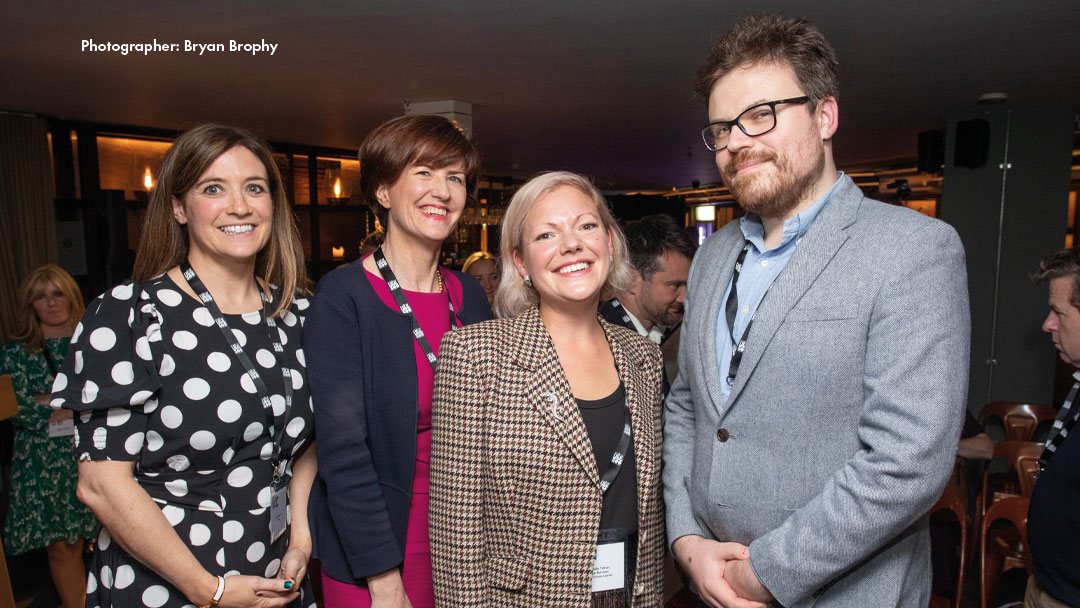Nathalie Tidman, Legal Business and IHL: What sector-specific challenges are you facing when it comes to strategic decision-making in-house?
Sally Anne Sherry, Bartra Group: There are a couple of challenges that are specific to real estate, and those are often related to legislative changes that happen quite quickly. For example, when co-living was introduced in Ireland and then effectively banned again with little warning. In the last few years, we have also been dealing with difficulties with the planning system and judicial reviews. A lot of the press coverage of it has gone quiet, but we are still stuck in judicial review cases where we are trying to deliver units and we cannot get out of the court system.
Alex Potlog, AbbVie: It is an easy question for pharmaceuticals, especially pharmaceuticals in Ireland because, we have as an industry managed to articulate that challenge in a clear way. We call it the innovation paradox.
What it is meant to convey is that Ireland is a country in which AbbVie, like many other pharmaceutical companies, has a really strong manufacturing footprint. However, Irish patients often have access to the innovative therapies manufactured in Ireland only after patients in other EU member states. It is paradoxical that this community that contributes so much to the advancement of manufacturing, R&D and science in general sees the product of that contribution used in other countries’ health systems before it’s used in Ireland.

Maura Connolly, Addleshaw Goddard: From a legal counsel point of view, many of our clients are trying to get on top of the incredible amount of new legislation that the government is introducing, particularly in the area of employment law, much of which is moving towards allowing people to request flexible working arrangements. There are changes with people essentially being able to work anywhere in the world, and that is a very welcome development, both from a legal perspective and from our clients’ point of view.
There is a new dynamic. Clients are working with employees who want to work in a different way. I can only imagine the challenge that presents for in-house counsel, because you are trying to not only do your own specialty subject but you are also expected to advise the HR function on all of this that is coming down the track.
Nathalie Tidman: What does value add mean to you? How does it link to your role as strategic adviser and how do you make that work in practice?
Alex Potlog: One of the things that I like the most about this job is that there are many different ways in which you can do it. There is definitely a way to do this job by focusing on the technical, legal stuff, but the environment that we are in lends itself to a more business-orientated approach. If you are going to read people the black letter law, that is going to be helpful in some contexts, but it does not add as much value as taking an enterprise perspective. Legal as a function, especially in pharmaceuticals, is more valuable when it thinks about things also from a compliance and an ethical point of view, and not just from a
legal point of view.
Sally Anne Sherry: We will always have a couple of favourite legal firms in the City and they are the people we go to for our most important transactions. But my advice would be to spread out your work across the City, keep trying new firms and new partners and creating contacts in the field.
Relationships are key. Wherever you trained, the people you trained with go up through the ranks with you. I keep in touch with people I trained with at Matheson and people I have worked with over the years, because they are key to getting transactions done and learning information about something that is coming. I aim to stay away from court unless absolutely necessary. I much prefer to head off litigation if I can, and that is much easier when you are closer to the network and to people who will pick up the phone and say: ‘There is a problem coming here.’

One of the last pieces of advice that I have is in relation to spreading out payment of legal fees for ongoing work. Don’t let it build up into one large fee at the end of the year. We would always try to pay as we go along on a monthly basis rather than letting it build up into one large fee at the end of the year and then the business is querying what the lawyers were doing all year for that amount!
Maura Connolly: Most of the time I am on the other side of the table, but relationships are critical to us as well. I can give my clients a much better service if I understand, not only the business, but also the perspective of what the client is trying to achieve and the internal dynamics. I will understand that much more if I am close to my colleague who is the internal counsel or the HR manager. I am not sitting at the boardroom table so I do not know what is really worrying them, but if I have someone who can help me understand what the real worry is here, then I can tailor my advice.
Nathalie Tidman: A common thread going through all your experiences is the ability to be agile and nimble in everything you do. What are your experiences of having to put that into practice and real-life examples of having to make a decision really quickly?
Maura Connolly: We had a highly pressurised situation where a retail client was implementing what looked on paper to be a neutral change in contractual terms. They were legally entitled to do what they wanted to do, and the advice from all was: ‘Absolutely, you have the right to do it. You do not need to consult the employees.’
That was mistake number one, because it turned out to be a highly sensitive issue. The employees got agitated about it two weeks before Christmas and that was the busiest time for the business. The pressure of there being industrial action and the impact on the company was an absolute crisis for the business, and the advice that was needed was not just legal advice. The legal advice was: ‘Of course, you can legally do it,’ but that is not the start and the
end of it. You have to think about ethics. You have to think about PR. You have to think about crisis management and the what-ifs.

Sally Anne Sherry: Very recently we had a large transaction and the funds had to move by 12 o’clock to meet the cut-offs. A last-minute query arose on the searches, just minutes before the deadline. We were able to reach agreement with the other side very quickly and the funds moved in time. Everything turned out fine but we would not have been able to react so quickly if we did not have such mutual respect and trust between the counterparties, which
was built up over time. Your word is your currency, and in the legal world and in business, it is really important.
Alex Potlog: I know everybody talks about agility these days to the point where its meaning has been significantly diluted. At AbbVie we are a small team supporting a growing business across five markets. We have to be agile by default, if we’re not, then we’re not meeting expectations.
I believe in the notion of a minimum viable product. There is work that is highly consequential for the business that we will focus on and spend time on and give all the attention to, and that is never going to be ‘agile’, just because of the implications or the impact or the consequences. Then there is a host of other things that are low value and low risk, where we aim to deliver the minimum viable product in terms of legal support, and that is arguably the agility.
We operate in local markets, but under the umbrella of a global company. There is a lot of process and policy that comes from global stakeholders. Some of that is not going to be 100% functional or viable for the local business. We have to figure out ways in which we can observe internal policy while landing on the right side of the external regulation, compliance, ethics considerations and so on. It is a challenge, but if you look at the legal function as a facilitator rather than an ultimate decision-maker, it gets a lot easier, because it forces you to think in a more pragmatic way.
Nathalie Tidman: There is no escaping the question of talent and talent retention. A lot of teams have been put under enormous pressure with Covid. What challenges have you faced and how have you adapted your strategies to deal with those issues?
Sally Anne Sherry: It is really important for me to encourage my team to look outside of the pure legal skills. Look at leadership, executive functions and finance. We lawyers are often allergic to finance, me included. But we cannot be part of the fabric of a business if we do not understand what makes money and what does not make money, so we have to get into the finance, whether that is doing courses like ‘finance for dummies’ or whatever you need.
Corporate governance is another thing that is hugely important, and I encourage my team, as I do myself: ‘Volunteer for charity boards. Volunteer for non-profits. Volunteer for the things that will give you an outside perspective. You will also get experience, and the company will encourage you to do something that is good for you and good for the company.’
Maura Connolly: We all know that there is an incredible competition for talent, and retaining talent is equally a big issue for law firms and also for in-house. In Addleshaw Goddard, we have a consulting wing that offers support to counsel to help them with organisational change, performance management and also focusing on the leaders that are within their team. Offering this service in addition to law has actually been something that is very attractive to our clients and also to people coming up within the firm.
We have a lot of focus on the development of our people, and it is critical that we do that, because that is what sets us aside from our competitors. It is a very competitive market, but it is about what the path is for any of our colleagues. How do they know that they can develop their skills? What supports are in place to help them become that person?
Alex Potlog: It is about keeping people engaged and giving them a perspective on their own career progression and development, and we really spend a lot of time thinking about that and working on that within our team and within AbbVie in general.
In terms of soft skills, leading and managing hybrid meetings is a genuine skill these days, and it is something that we should all try to get better at, because that is what pulls people into the discussion when they are not physically present in the same room, giving them an opportunity to contribute. At the same time, I have seen a lot of people in different teams and different functions doing a little bit too much with all this hybrid and remote stuff, putting too much pressure on either having people back in the office to spend time face-to-face, or texting people every other hour.
There is no one-size-fits-all solution. It depends a lot on the other person and how they respond to that. There are colleagues, for example, who really appreciate regular touchpoints. If we do not connect for two or three days, they start getting a little bit anxious. There are also people who are really sensitive to this overbearing engagement, and if I start texting them twice a week, they are going to say: ‘Leave me alone.’

Nathalie Tidman: I am interested to hear your take on how present innovation is and how much that involves actual tech. Are there different ways of innovating that are more important than tech in your various worlds and roles?
Maura Connolly: There are some aspects of everybody’s roles that are more commoditised, and there are some things you should just do in the most efficient possible way. Technology allows us to have certain documentation and other things done effectively, such as by use of templates. If you are trying to differentiate yourself and say: ‘We are adding value. We are helping our in-house counsel give a good service to their clients,’ then technology is fundamental to that, but it is not technology for technology’s sake. It has to be
delivering something.
Alex Potlog: Tech is not something that we use a lot. We use Teams and SharePoint, but the main reason why we do not see a lot of value for tech in what we do is because we try to do things that are not capable of being automated. It is our choice as a team to focus on stuff where we have to think outside the box and look at one-off, unique situations and scenarios that we can contribute to, instead of doing things that come back to us over and over again.
The other thing is rethinking the role of the legal team and the legal function as a whole. One of the things that we have done at AbbVie has been to remove legal from the day-to-day vendor contracting process. When you think about contracts and legal, everyone marries that up, but for us vendor contracting is a low-risk activity most of the time. There is really no need for legal to be in the driving seat, so we streamlined that whole process and created a host of templates, guidance, computer-based training and playbooks for business owners involved in negotiating those contracts with those vendors.
Sally Anne Sherry: One thing that has made a big difference to my life is using DocuSign for our contracts and other agreement. There was a fear that, if we use DocuSign, somebody will question its validity. But it is perfectly valid and we have been using it for a few months now. It is very efficient compared to all of the printing and scanning that we were doing beforehand. We will still always have to use it for property documents, conveyances, transfers and those kinds of things, but there are so many documents now that you can use DocuSign for. For me, it has been hugely beneficial.
Nathalie Tidman: How do you educate the business on the importance of the legal function?
Alex Potlog: We should accept the premise that there will always be a situation every once in a while where legal should be involved in something right from the beginning and it’s not. I try to make comparisons wherever possible between outcomes where legal is involved early and outcomes where legal is involved late or not at all. Most of the time the comparison speaks for itself.
Nathalie Tidman: Thank you all for coming. It’s great to see everybody enjoying in-person events again. Please show your appreciation for the excellent panellists.
The panellists
- Nathalie Tidman, Editor, Legal Business and The In-House Lawyer (chair)
- Alex Potlog, Legal director, UK & Ireland, AbbVie Ltd
- Sally Anne Sherry, Director and GC, Bartra Group
- Maura Connolly, Partner and head of dispute resolution and employment, Addleshaw Goddard, Ireland


